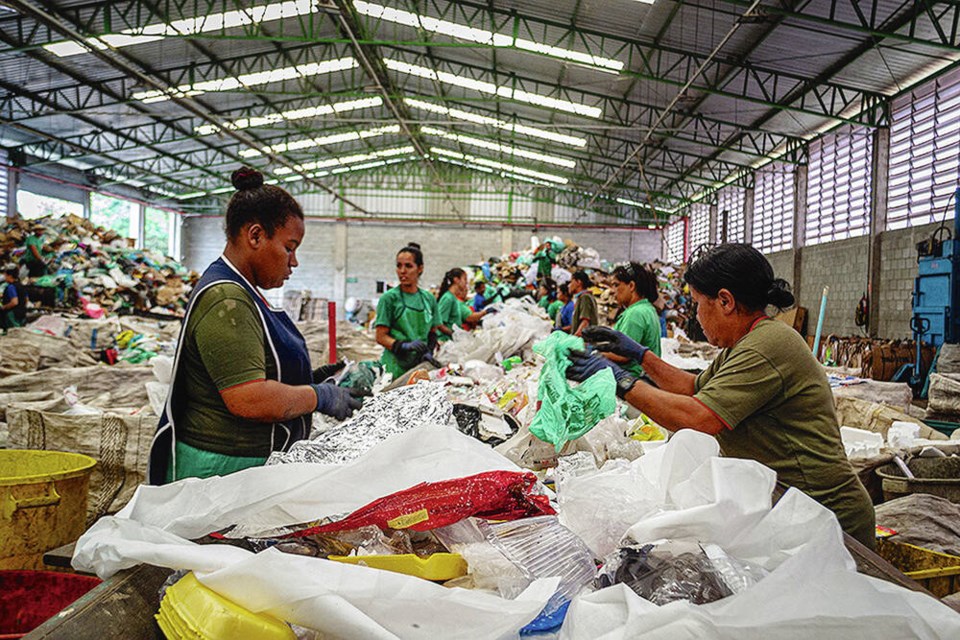A professor at the University of Victoria who helped establish a university for waste pickers in Brazil is hoping to bring the same educational opportunities for those doing similar work in the capital region.
On garbage pick-up days in Brazil, it’s common to see waste pickers — or catadores, as they are commonly known — go through city neighbourhoods and landfills with their distinctive handmade carts in tow, ready to sift through waste for recyclable materials to sell.
Jutta Gutberlet, a UVic professor who specializes in the study of waste management systems, said catadores have a hard, dangerous job that doesn’t pay well.
“There’s hospital waste sometimes mixed in … they open the bag and grab things which are contaminated and [get] cut,” she said.
One catador that used to work out of a landfill in Rio de Janeiro told Gutberlet that a person gets hurt on the job nearly every week, she said.
The job of diverting still-useful materials from waste is an ancient profession.
In North America, rag-pickers and metal collectors were still commonly seen until up to 50 or 60 years ago, which was when municipalities began putting in more sophisticated waste management systems, she said.
In Victoria, garbage that wasn’t collected by waste pickers was barged out and thrown into the ocean until as late as 1950, she said.
“Waste management as we know now is very recent,” she said.
Catadores form the backbone of Brazil’s recycling infrastructure.
Gutberlet said waste pickers are some of the most stigmatized people in Brazilian society. “They have been exploited by everybody.”
These workers often live near or below the country’s daily poverty rate of $2.15 US ($3.10 Cdn), the professor said.
In contrast, a unionized waste-collector working for the municipality of Saanich gets paid $33.51 an hour.
Since October, about 200 waste pickers in the Brazilian cities of Brasília and São Paulo have been eligible for micro-credentials issued out of UVic’s continuing studies division.
These waste pickers are students at Universidade de Catadoras e Catadores, a new higher-learning institution that’s partnered with 11 universities across the world as well as UNESCO. Class topics include waste management, entrepreneurship, and social responsibility.
Jo-Anne Clarke, dean of UVic’s continuing studies division said in a statement that mico-credentials help to democratize education. “We’re closing that gap between who gets access to university and who doesn’t,” she said.
Gutberlet was initially a researcher on social inequalities experienced by people living on the edges of urban society when she joined UVic’s geography department in 2001.
After meeting Jocemar Silveira on the streets of a lower-income São Paulo neighbourhood during a 2006 research trip, Gutberlet’s academic career took a different tack.
Silveira was a former waste picker who was organizing his fellow workers in São Paulo into associations.
At that time, recycling was starting to become a topic of national attention in Brazil.
Silverira was a community leader who invented a trash compactor made out of wood and an environmentalist who taught others in his neighbourhood on how to separate recyclables from their household waste, Gutberlet said.
Advocacy from waste pickers like Silveira helped change legislation that mandated municipalities to contract with local catadores who had organized themselves into collectives, Gutberlet said.
It was the first step of integrating often-exploited and informal recycling workers into the local waste management system, she said.
Silveira, who died this month from a heart attack at the age of 54, was always curious about the world and wanted to learn more despite his scant formal education, Gutberlet said.
There are between 360,000 and 800,000 waste pickers in Brazil, depending on whether you go with government figures or the higher estimates from the national movement of waste pickers, Gurberlet said.
About 80 per cent of waste pickers are of either Afro or Indigenous descent, she said.
Gutberlet, who was born in Germany but grew up in Brazil, said she believes that education is the best way to promote social change.
Students at Universidade de Catadoras e Catadores learn about health-and-safety practices, business management tips and the latest innovations in the recycling sector.
The three-year program, which is split into six semesters, begins with the history of waste pickers standing up for their rights in Brazil, as well information about similar social movements in Colombia, Tanzania and Kenya.
Gutberlet said the final part of the program involves the students coming up with their own research thesis.
Rozenir “Aninha” Rodrigues Souza, a current student at Universidade de Catadoras e Catadores, has been working as a catadora in São Paulo for 30 years ever since she started in 1994.
For Rodrigues Souza, a mother of three, waste-picking is her only form of income, she told the Times Colonist.
“I came here from [northeast state of] Bahia with no other way of life,” she said in Portugese.
The courses at Universidade de Catadoras e Catadores give her hope in life, she said. “I can now see and value my identity as a catadora through this course.”
Gutberlet also works with waste pickers in Victoria, who primarily consist of people who pick up spent bottles and cans and turn them in to bottle depots for the refund fees.
A 2022 survey of 50 people in the capital region shows that waste diverters here face similar challenges to the catadores in Brazil — dealing with cuts and infections arising from the work, lack of proper waste-sorting in communities, and the stigma and harassment from other members of the public.
“In the future, we’re hoping to also establish a classroom here on the West Coast,” Gutberlet said. “The people here are even more excluded than the waste pickers in Brazil.”
>>> To comment on this article, write a letter to the editor: [email protected]




